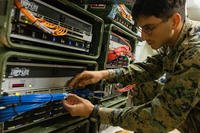Amid heightening tensions in the South China Sea and continued emphasis on a regional rebalance, the Pacific is a hotter topic than ever for the Navy.
But at the Navy League's Sea-Air-Space expo next week, Pacific topics are missing from the seminar lineup, in favor of other hot-button issues such as cyber and information warfare.
Even so, just because the Pacific isn't a headliner doesn't mean it won't be talked about, said Kevin Traver, staff vice president of corporate affairs for the Navy League and a key organizer for the conference.
"I'd be shocked if the Pacific is not discussed at some of these round tables," he said. "I think what we try to strike is a balance on the needs of the Navy, Marine Corps and Coast Guard and also our customers who are the industry guys, and have open and honest discussions on how industry can help the services down the road."
As rhetoric surrounding Chinese acts of militarization and territorial claims in the South China Sea has heated up, some have alleged that the administration is trying to mute the loudest military voices on the issue.
Navy Times reported in April that National Security Adviser Susan Rice had imposed a "gag order" on military brass over the issue after Adm. Harry Harris, commander of U.S. Pacific Command, spoke candidly about his interest in confronting China over what he called clear instances of militarization in the region. The White House has denied such a gag order exists.
While Harris and other key Navy commanders in the Pacific, including Pacific Fleet Commander Adm. Scott Swift, will be absent from the conference, Traver said that fact is merely circumstantial.
"I don't think there was a specific request for [Harris and Swift] to speak," he said. "They were invited, and for operational reasons, they're not attending."
While Navy League officials solicit feedback from the sea services in designing the annual conference, Traver noted that it is independently organized and planned by the Navy League.
Seminar topics highlighted this year, including cyber, recruiting and retention, and "high-velocity learning," were developed with insights from service leaders on their preferred emphasis for professional training.
"It's really a professional development platform for the Navy, Marine Corps and Coast Guard," Traver said. "From a certain point of view they are guiding things along and saying, ‘Hey, these things are important to us.'"
But on certain panels, including the service chiefs' annual update discussion and a round table on strengthening naval power, questions about the Pacific are bound to arise.
Revelations that the Navy's fiscal 2017 shipbuilding plan, sent to Congress this week, keeps to a goal of 308 ships, below the Chinese Navy's 2020 goal of 350, may spark additional conversations about competition in the Pacific.
"We're going to talk ad nauseam about how we're going to build better and bigger and more ships," Traver said.
Sea-Air-Space will be held May 16-18 at the Gaylord National Convention Center in National Harbor, Maryland, near Washington, D.C.
--Hope Hodge Seck can be reached at hope.seck@military.com. Follow her on Twitter at @HopeSeck.































